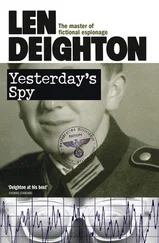Len Deighton - Spy Sinker
Здесь есть возможность читать онлайн «Len Deighton - Spy Sinker» — ознакомительный отрывок электронной книги совершенно бесплатно, а после прочтения отрывка купить полную версию. В некоторых случаях можно слушать аудио, скачать через торрент в формате fb2 и присутствует краткое содержание. Жанр: Триллер, на английском языке. Описание произведения, (предисловие) а так же отзывы посетителей доступны на портале библиотеки ЛибКат.
- Название:Spy Sinker
- Автор:
- Жанр:
- Год:неизвестен
- ISBN:нет данных
- Рейтинг книги:4 / 5. Голосов: 1
-
Избранное:Добавить в избранное
- Отзывы:
-
Ваша оценка:
- 80
- 1
- 2
- 3
- 4
- 5
Spy Sinker: краткое содержание, описание и аннотация
Предлагаем к чтению аннотацию, описание, краткое содержание или предисловие (зависит от того, что написал сам автор книги «Spy Sinker»). Если вы не нашли необходимую информацию о книге — напишите в комментариях, мы постараемся отыскать её.
Spy Sinker — читать онлайн ознакомительный отрывок
Ниже представлен текст книги, разбитый по страницам. Система сохранения места последней прочитанной страницы, позволяет с удобством читать онлайн бесплатно книгу «Spy Sinker», без необходимости каждый раз заново искать на чём Вы остановились. Поставьте закладку, и сможете в любой момент перейти на страницу, на которой закончили чтение.
Интервал:
Закладка:
It was a curious party, marked by a certain stiffness that was in no way accounted for by any shortcoming in Fiona's grasp of the language. Yet the birthday rituals seemed rehearsed, and even when the drink had been consumed, Fiona noticed no substantial relaxation amongst the guests. It was as if they were all on their best behaviour for her.
Among those seated round the table there was Renn's daughter Käthe, noticeably pregnant, and her dutiful husband who worked in one of the lignite-burning power stations that polluted the Berlin air. Hubert Renn's bearded brother Felix was a retired airline pilot, seventy years old and a veteran of Spain's civil war. There were also a man and his wife who worked as clerks in the same building as Fiona and Renn, and, seated next to Fiona, a cordial Englishwoman named Miranda. She was, like Fiona, in her middle thirties and spoke with the brisk accent affected by smart Londoners, and those who wish to be mistaken for them.
'It's an unusual name,' said Fiona. 'Is that a tedious thing to say?'
'I chose it. I was an actress before I married. It was my stage name. I discovered it when I was in The Tempest at school. I was a terrible little snob. It stuck.'
'It's a lovely name.'
'No one over here thinks it's very unusual, of course, and I've got used to it.'
'Were you an actress in England?'
'Yes. I was quite good. I should have kept to it but I was getting on for thirty years old and I'd never had a decent West End part. My agent had decided to retire. A man fell in love with me and I married him. You know how it happens.'
'And he was German?'
'Very German… young and sexy and masterful, just what I needed at the time, I suppose. He was on holiday in England and staying with people I knew.'
'And he brought you to Berlin?'
I'd been a member of the party since I was eighteen so I couldn't yield to the capitalist lures of Hollywood, right? And my mister-right had friends at the Babelsberg film studios. Babelsberg, I thought, the UFA studios; Josef von Sternberg, Emil Jannings, Greta Garbo, Marlene Dietrich. Wow! And this Wunderkind guaranteed that there would be plenty of acting work over here.'
'And was there?'
'I don't know, I promptly became pregnant, so after a few one-day jobs playing Englishwomen and American women for TV, I looked for other work. I did ghastly little jobs translating for various government departments: travel adverts and that sort of garbage. And then my husband died.'
'Oh, I'm sorry. What did your husband do?'
'He got fall-down drunk.'
'Oh,' said Fiona.
'Little Klaus was born. I managed. I had the apartment and there was a decent pension. I suppose the DDR is the best place to be if you have to find yourself a widow with a baby.'
'I suppose it is.'
'You're married?'
'I left my husband to come here,' said Fiona. It had become her standard reply to such questions but it still hurt her to say it. Into her mind there immediately came the picture of Bernard and the two children sitting round the table eating a frozen dinner the night she first met Harry Kennedy. How she yearned for them now.
'Yes, Hubert told me that you'd given up everything for your beliefs. That was a wonderful thing to do. Your perfume is heavenly. Sometimes I think good make-up and perfume are the only things I miss. What is it… if you don't mind me asking?'
'No, of course not. Arpège. I haven't graduated to any of the new ones. Was your husband related to the Renns?'
'Arpège, yes, of course it is. Hubert is the Godfather to my little Klaus.'
'I see.'
'Not really a Godfather, of course; this ersatz arrangement they have over here.'
' Namengebung ,' said Fiona. It was the secular ceremony permitted by the communist regime.
'Your German is fantastic,' said Miranda. 'Fancy your knowing that. I wish my German was half as good. When I hear you gabbing away, I envy you.'
'Your German sounded excellent to me,' said Fiona.
'Yes, it's very fluent, but I don't know what I'm saying half the time.'
She laughed. 'I suppose that's how I got myself into trouble in the first place.'
It was then that Hubert's brother Felix stood up to propose a toast. The Sekt was poured, and the cake was cut. Cakes are to German-speaking people what souffles, spaghetti and smoked salmon are to their European neighbours. Hubert Renn's birthday cake in no way challenged this doctrine. The beautifully decorated multi-layered cake was so big that even one thin slice proved too much for Fiona.
Feix, a tall bony old fellow with a closely trimmed beard, proved to be a good speaker and he kept the company amused for five minutes before toasting the Renns.
When the celebration ended they came outside to find a brilliant moon. A light wind moved the trees and there was no sound other than a distant plane. Felix Renn said it was the late flight heading out of Berlin for Warsaw.
Declining offers of a car ride, Fiona walked back to Grünau Station. She had discovered walking to be one of the compensations of her life here. A woman could walk in these empty streets without fear of being attacked or accosted, and even this urban neighbourhood, so near the centre of town, was green and rural.
Living alone in a strange town had not been good for Fiona. She kept telling herself that it provided her with a chance to collect her thoughts in a way she could never do before. In fact the loneliness had slowly given way to bouts of depression: black and morbid moods, not that state of low spirits that is called depression by those who have never known the real thing. Fiona had the black bouts of despair and self – disgust from which recovery comes slowly. And like most psychological illness her fears were rooted in actuality. It was crippling to be without Bernard and the children – and painful to think how much they must hate her. Only with great difficulty was she able to endure her miseries.
Work was the medicine she took. When she wearied of the work provided by her job, she read German history and improved her spoken and written German: she still got the cases wrong sometimes. She never thought about how long she might be here. Like a committed combat soldier she adjusted her mind to the idea of being dead. Fortunately Renn, and the others, had not known her in her normal frame of mind and assumed that this moody woman with her unexplained silences and flashes of bad temper was the person she had always been.
As she walked along under the trees, the moonlight bright enough to throw her shadow on the grass verge, she speculated about Renn's birthday party, and his choice of guests, and could not help wondering if there was to be another birthday party that would better reflect the relatives, friends and neighbours that he clearly had in abundance. Were the people present the ones closest to him and his wife after a lifetime spent here in the city? If not why not?
And if such an elegant little dinner – extravagant by the standards of life in the DDR – was a normal event in the life of the Renns, why had his wife Gretel not worn that dress for eight years?
What of the forthright Miranda? In this puzzling town, with all its half-truths and double-meanings, there was nothing more enigmatic than candour. She still hadn't worked it out by the time she reached Grünau. The grandiose nineteenth-century Stadtbahn station was bleak and neglected, a puddle of rain under the arch, cracked paving and its shiny brickwork, and enamel signs, stained with dribbles of rust. And yet the platforms were swept and tidy and the litter bins emptied. To Fiona a lot of the East sector of the city was like this; like the dilapidated mansion of some impoverished duchess who will not admit defeat. The other people waiting for the train were quietly spoken and respectably dressed. Even the mandatory drunk was sitting on a trolley humming softly to himself.
Читать дальшеИнтервал:
Закладка:
Похожие книги на «Spy Sinker»
Представляем Вашему вниманию похожие книги на «Spy Sinker» списком для выбора. Мы отобрали схожую по названию и смыслу литературу в надежде предоставить читателям больше вариантов отыскать новые, интересные, ещё непрочитанные произведения.
Обсуждение, отзывы о книге «Spy Sinker» и просто собственные мнения читателей. Оставьте ваши комментарии, напишите, что Вы думаете о произведении, его смысле или главных героях. Укажите что конкретно понравилось, а что нет, и почему Вы так считаете.












